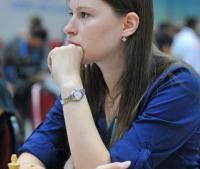
Olympic Notes
The World Chess Olympiad. Intrigue, unpredictability, a holiday for all the participants. The strongest team tournament, held every two years, identifies the number one team in the world. It is a must-follow for any chess fan.
This year's host of the Olympics was the cozy city of Khanty-Mansiysk, which has organized the tournament on a brilliant level. Nothing distracted the players from the game. I would like to share with you my personal impressions of both the men's and women's tournaments. Due to the fact that Russia was the organizer, it had the right to introduce a few teams. I was asked to lead the second team, composed of our young and very promising chess players. Competing on the first board is a special responsibility and, at the same time, an opportunity to face the leading masters from all over the world. Unfortunately, I was not in a very good shape. While some of the games were played at a very decent level, in others I blundered terribly and ended up with only 5.5 points out of 11 (as opposed to 5.5 out of 7 in 2008 as a reserve player of the Russian team). Also, despite our best efforts, a loss to the invincible Russia-1 in the final round threw our team back to the 10th place. In the case of a last-round win we would have taken either bronze or 4th place (so much for conspiracy theories). The rating favorite, Russia-1, deserved the victory in this event. Other teams didn’t even come close to its results. To give you a sense of how strong the team is, the current World Champion Alexandra Kosteniuk was playing on board 3 for it, and the two-times runner-up to the Champion of the World Alisa Galliamova – on board 4! This level is impossible to match for other teams, of course. This Olympiad will also be remembered for an especially high rate of inexplicable blunders by the world’s leading players. The reasons for it are not clear to me, but at Dresden this wasn’t the case. The Chinese team, which used to be quite formidable, seemed to struggle and won silver only due to strong will and determination. Georgia got bronze due to playing without the legendary Maia Chiburdanidze. Kudos to Cuba – their 4th-place result has become the main sensation of the tournament. The Cuban team is rather solid and very friendly, as it seems. Atmosphere and good relations between players mean a lot in team events.
In the men’s section the whole tournament became a race between Russia-1 and Ukraine. Our men’s team was trying to do its best to win a home-ground Olympiad, but alas. This time Ukraine proved to be stronger when Russia-1 once again failed to beat Spain in the final round, while Ukraine instantly agreed to a draw with Israel (granting the latter bronze and the former – gold). Ex-FIDE World Champion Ruslan Ponomariov has finally agreed to play for his national team again (Ukraine won the Olympiad in 2004, after that he didn’t play for his country). Once again, it became obvious that team events are special in terms of motivating some grandmasters to play at the top of their capabilities to support other members of the team. This results in multiple upsets, e.g. Bluvshtein (2583) vs Topalov (2803); Sjugirov (2627) vs Carlsen (2826); Teterev (2511) vs Short (2690); Djukic (2475) vs Wang Yue (2732), etc. Generally speaking, the Olympiad has brought us lots of exciting games, new heroes, and lots of positive impressions.
And now let’s talk a bit about chess itself. In the first round we faced the team of Singapore.
My opponent kept maneuvering rather shyly, missed her chances, and allowed me to initiate a dangerous attack. After trying to defend in vain, she lost a pawn and, eventually, the game.






